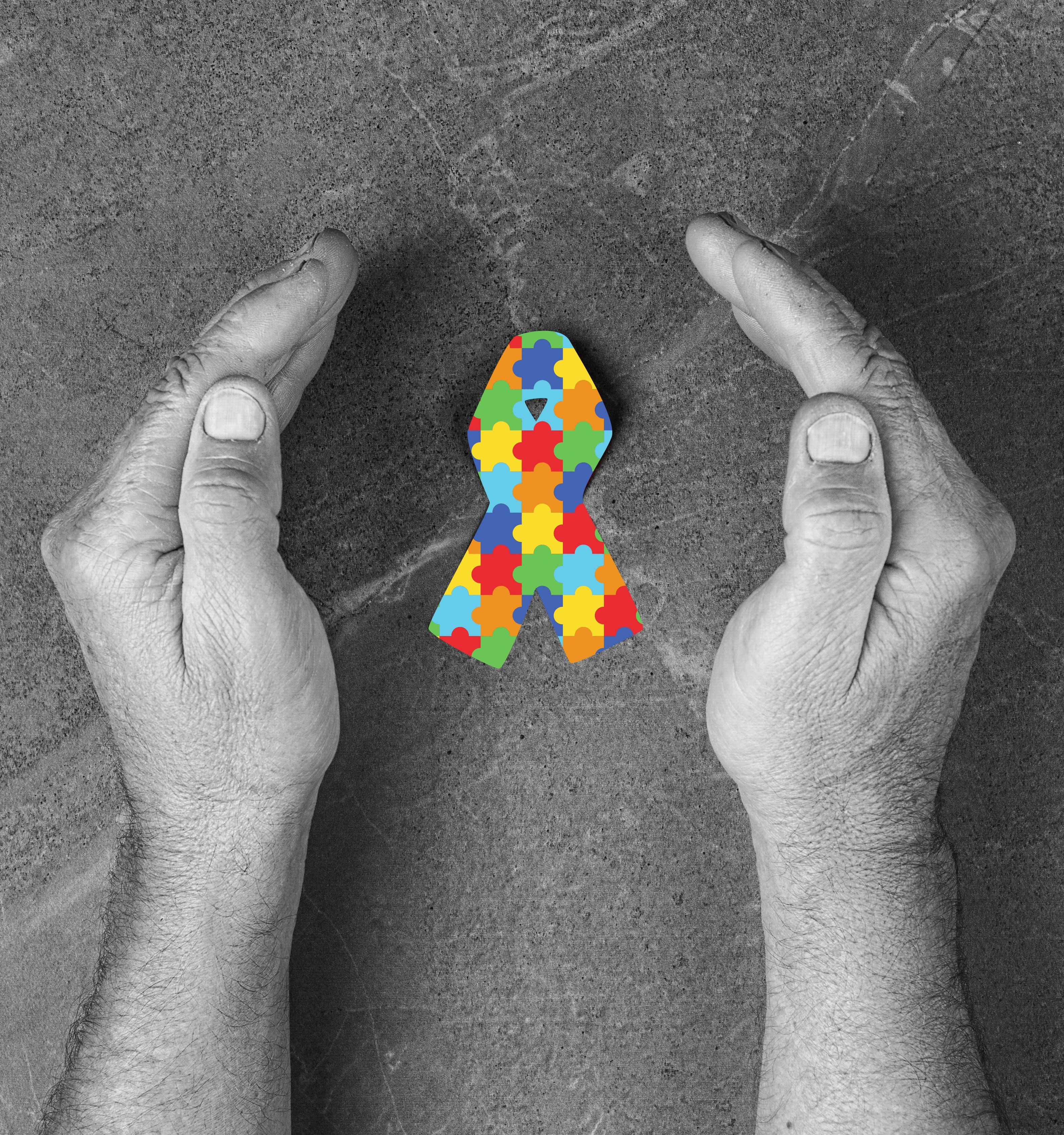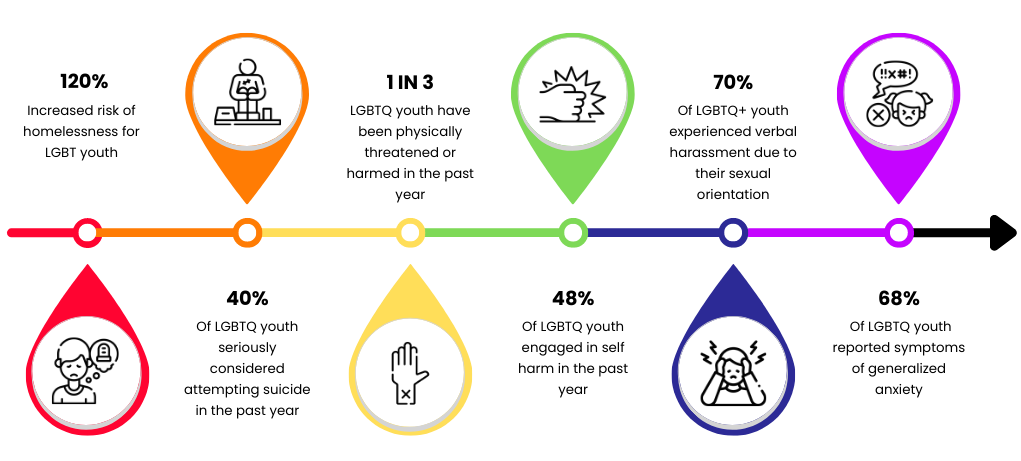Providing Culturally Competent Mental Health Care to LGBTQIA+ Youth & Young Adults

Introduction to LGBTQIA+ Population
Many mental health care providers want to support lesbian, gay, bisexual, transgender, queer, intersex, and asexual (LGBTQIA+) clients but lack the vocabulary, knowledge, and training to confidently do so. More youth and young adults than ever before identify as LGBTQIA+. A 2020 poll by Gallup Institute found that 5.6% of U.S. adults identify as lesbian, gay, bisexual, or transgender (LGBT).1 The poll also found that 15.9% of surveyed Generation Z adults (ages 18-23 at the time of poll) identify as LGBT, a larger proportion than any previous generation.1
Mental Health & LGBTQIA+ Individuals
Research has found that LGBTQIA+ youth and young adults have worse mental health than their heterosexual, cisgender peers including higher rates of depression and suicidal ideation.2 The 2015 National Survey on Drug Use and Health (NSDUH) found that lesbian, gay, and bisexual (LGB) adults had more than twice the rate of mental illness than straight adults -- 37.4% of LGB adults reported a mental illness in the past year, compared to 17.1% of straight adults.3
Experts believe that these mental health disparities among LGBTQIA+ individuals are the result of experiencing discrimination and rejection.2,4 The minority stress model explains that “stigma, prejudice, and discrimination create a hostile and stressful social environment that causes mental health problems.” 4 LGBTQIA+ youth are especially vulnerable to social rejection, whether it be in the form of being kicked out of their home by unaccepting parents or experiencing bullying and violence at school. 2,4-7
In simpler terms, the high prevalence of mental health conditions in the LGBTQIA+ youth population is not due to anything inherent about LGBTQIA+ youth, but rather a result of the trauma of experiencing social stigmatization and rejection. According to the minority stress model, while stigma and rejection has a deleterious effect on the mental health of youth, support and acceptance can have a protective effect.4, 8


In the face of stigma, violence, adverse life events, and worsened mental health, having supportive, affirming adults in their lives can have a significantly positive effect. According to the Trevor Project:
“LGBTQ youth who report having at least one accepting adult were 40% less likely to report a suicide attempt in the past year.” 2
1. Accept LGBTQIA+ youth & work to understand & affirm clients’ gender identities & sexual orientations
LGBTQIA+ youth may distrust the mental health system due to the history of LGBTQIA+ individuals being labeled as inherently mentally ill and subjected to physically and psychologically harmful “treatments”.9-11 It is crucial for mental health providers to be knowledgeable and affirming of their LGBTQIA+ clients to earn their trust.
- 20% of LGBTQ youth cited not thinking a mental health practitioner would understand their identity as a barrier to receiving mental health.9
- 22% of LGBTQ youth cited a previous negative experience with mental health providers as a barrier for receiving mental health care.9
2. Understand that stigma, discrimination, & a lack of acceptance of LGBTQIA+ individuals occur on a spectrum & hold space for clients to share microaggressions
It is important for mental health care providers to understand that a lack of acceptance of their LGBTQIA+ clients can occur on a spectrum. An incident does not have to rise to the level of physical violence or verbal abuse to be damaging to a youth or young adult’s mental health.
- For example, a parent’s lack of acceptance of their LBGTQIA+ child does not always take the form of them kicking their child out of the house. It can also take the form of a parent consistently failing to use their child’s correct name and pronouns.8
3. Ask & honor the pronouns & names of LGBTQIA+ youth & young adult clients
An important way to show acceptance of LGBTQIA+ young adults is to ask and honor their pronouns and names. Using the wrong pronouns (misgendering) or calling a client an incorrect name is painful and rejects who they are.8,12,13
- Transgender youth who can use their chosen name at home, school, work, and with friends reported a 50% + decrease in severe depression and suicide attempts compared to transgender youth who could not use their chosen name.12
Do not assume you can guess a client’s pronouns by looking at them. Instead, ask clients what name and pronouns they wish to be referred by, and in what settings. Sharing your pronouns is a great lead-in to ask someone their pronouns.
- Avoid using the language of “preferred pronouns”, as “preferred” indicates it is optional to respect an individual’s gender identity and chosen pronouns.
- A transgender client might feel comfortable using she/her pronouns in your private sessions but only use he/him pronouns with their family. Be mindful of the setting.
- Many LGBTQIA+ youth and young adults use they/them pronouns instead of the binary she/her or he/him.
- Some LGBTQIA+ youth and young adults may use more than one set of pronouns interchangeably, such as she/they.
- Some LGBTQIA+ youth and young adults use neo-pronouns, which are pronouns outside of she, he, and they, such as “ze/zir”.13
4. Prioritize confidentiality & communicate upfront its bounds
An essential part of building and maintaining trust with young LGBTQIA+ clients is clearly communicating and honoring the bounds of confidentiality. 14,15 Youth and young adults are unwilling to disclose information to a mental health provider that will be shared with their parents – especially LGBTQIA+ youth and young adults.8,9,16-18
- 22% of LGBTQ+ youth cited fear of being outed as a barrier to receiving mental health care.9
- Outing someone -- disclosing someone’s LGBTQ+ identity without their permission – can result in LGBTQIA+ youth and young adults facing violence, being kicked out of their homes, or committing suicide.17-19
When treating minors, mental health providers may have to navigate conflicting ethical and legal obligations.16-20 Having a signed parental agreement of privacy allows a mental health provider to protect the trust of a young LGBTQIA+ client and adhere to federal and state laws.
- Under federal law, a minor’s guardian must consent to medical treatment and can also access the minor’s medical records.20
- Best practice is to discuss confidentiality with LGBTQIA+ minors and their parents prior to beginning treatment.
- Clinicians can ask parents to sign a parental agreement of privacy. This is a form consenting to the therapist keeping their child’s information private from parents -- apart from self-harm and harm to others.16
- Many parents are willing to grant their child this privacy once they understand it is in the interest of their child’s safety and wellbeing.18
5. Be open to & knowledgeable in how to assist clients in obtaining gender-affirming care as needed
Access to gender-affirming tools, clothing, and medical treatments can be life-changing for transgender and gender non-conforming (TGNC) youth and young adults struggling with gender dysphoria.8, 21-24. Gender-affirming mental health care is a key aspect of gender-affirming treatment. Mental health professionals have an ethical obligation to seek out supervision, collaboration, consultation, and/or referrals with an expert in this field when needed.14
- For example, a therapist may be able to provide excellent treatment for an LBGTQIA+ client’s anxiety but not be qualified to treat this same client’s gender dysphoria. In this situation, a referral or consultation with a gender specialist would be needed.
In addition to gender-affirming mental health care, the American Psychological Association recommends that psychologists work collaboratively with other providers to assist transgender and gender non-conforming (TGNC) clients suffering from gender dysphoria to transition socially and/or medically.21
- Research has shown that access to gender-affirming medical care is correlated with decreased depression and suicidality in transgender and nonbinary youth and young adults.21-24
Additional LGBTQIA+ Resources for Mental Health Providers
Additional Resource Links for Mental Health Providers serving LGBTQIA+ Youth
Glossary of LGBTQIA+ Definitions
References for "Culturally Competent Mental Health Care to LGBTQIA Youth and Young Adults" webpage

 The above statistics* illustrate the heightened risks LGBTQIA+ youth experiencing adverse life events and symptoms of mental health conditions because of stigma and discrimination.5-7
The above statistics* illustrate the heightened risks LGBTQIA+ youth experiencing adverse life events and symptoms of mental health conditions because of stigma and discrimination.5-7